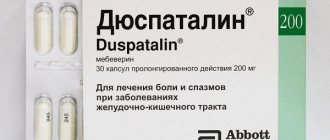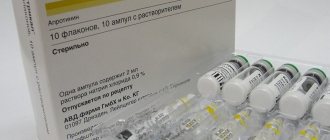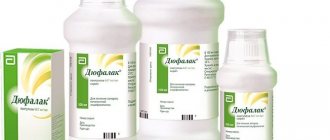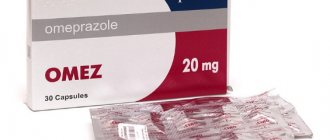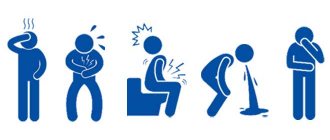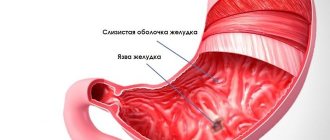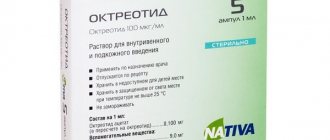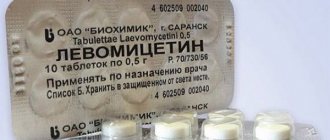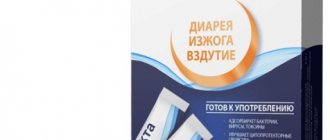Nausea turning into vomiting is familiar to, perhaps, every person. A painful feeling of involuntary spastic contractions, reflux of gastric contents into the esophagus, accompanied by severe heartburn, pain are typical symptoms of vomiting. As a rule, it does not develop spontaneously; the release of vomit is preceded by pale skin, cold sweat, increased salivation, rapid heartbeat, and general weakness.
The reason for this phenomenon is the body’s protective reflex associated with irritation of the gastric mucosa. He seeks to free himself from the substance that caused the disorder. Less commonly, vomiting is psychogenic in nature and is associated with disruption of the central nervous system.
Whatever the reason for this painful protective mechanism of the body, the list of medications that can stop vomiting is extremely limited. However, an antiemetic injection exists. This is what we will talk about.
Indications and contraindications for use
The list of indications for prescribing medications that relieve symptoms of nausea and stop vomiting is quite extensive. Situations in which an anti-vomiting and nausea injection may be needed depend on various factors:
- pregnancy:
- alcohol intoxication;
- food poisoning;
- chemotherapy for patients with cancer;
- rotavirus infection;
- mental illness.
Pregnancy is the most common factor in prolonged and persistent vomiting, caused by hormonal changes in the body of women. Vomiting is one of the symptoms of pregnancy toxicosis syndrome. Most often it appears in the 4th...5th weeks of gestation and intensifies by the 9th week. Disappears spontaneously in the 16th...18th weeks. Rarely, it can last until the 22nd week, which indicates late gestosis that requires drug treatment. About 50% of pregnant women suffer from vomiting in the early stages, but only 8-9% of them require the use of an antiemetic.
Alcohol intoxication is a symptom that is equally familiar to both men and women. Typically, women are much more susceptible to it. The causes of vomiting after alcohol poisoning can be:
- low-quality drink with a high content of fusel oils;
- impurities of methanol or heavy fractions of alcohol in the drink;
- drinking alcohol for a long time;
- single use in a dose exceeding 0.5 liters of vodka.
Food poisoning - may be associated with the consumption of food that has been subjected to bacterial contamination, or food containing large amounts of irritating ingredients (salt, vinegar, pepper, mustard and other hot seasonings) or vegetable or animal fats.
Vomiting in cancer patients undergoing radiotherapy or chemotherapy is caused by the development of radiation sickness syndrome, accompanied by negative reactions from the digestive tract. The same reaction is caused by antitumor drugs that reduce the body's immune barriers.
Rotavirus primarily affects the mucous membranes, including the gastrointestinal tract. Rejection of dead gastric mucosa is accompanied by vomiting. The body naturally strives to cleanse itself of dangerous dead tissue.
Mental illnesses – a large group of mental disorders are accompanied by vegetative symptoms. People who follow diets aimed at reducing body weight often suffer from such disorders.
Contraindications to taking antiemetic drugs are:
- intestinal infections;
- alcohol poisoning;
- any other situation with vomiting, when the body seeks to get rid of toxins or foreign objects that have entered the body.
An exception is radiation sickness that develops in a patient as a result of irradiation for the treatment of cancer. In these cases, nausea and vomiting are not considered as a defense mechanism of the body, and patients relieve vomiting spasms with medications.
How to eat if you have an upset stomach?
In order to restore the digestive system after diarrhea, doctors recommend abstaining from food for the first 5-7 hours. The patient is advised to drink plenty of fluids to prevent dehydration. Tea is good. Some types of medicinal herbs have strengthening properties. Kissel is very useful for diarrhea. If you eat meat, then only lean beef, chicken fillet or rabbit meat.
It will also be healthier to eat boiled rice, it holds together the contents of the gastrointestinal tract. It is better not to add seasonings at all and not to overdo it with salt. You can also eat fish. But it is better to steam it.
Buckwheat, rice or oatmeal porridge cooked in water has a good effect on the intestines. Just don’t cook porridge with milk. From dairy products you can eat low-fat cottage cheese. If kefir, then only low-fat and fresh. Prepare soft-boiled eggs. Soups are made with lean beef. You can eat vegetables that have been boiled in soup, but fresh ones are prohibited.
Avoid eating any baked goods with baked goods. You can only use crackers from regular bread if you dried them yourself. Fresh fruits, like vegetables, should not be eaten during the recovery period after poisoning.
After the symptoms of diarrhea stop, follow the diet for a few more days.
Video - Treatment of diarrhea with folk remedies
Types of antiemetic injections
Antiemetic drugs intended for intravenous or intramuscular administration have different mechanisms of action. Therefore, their prescription and use should be supervised by a doctor.
All drugs that suppress the gag reflex can be divided into four groups:
- serotonin receptor antagonists;
- histamine-sensitive H1 receptor blockers;
- dopamine antagonists;
- anticholinergic drugs.
To understand how this or that antiemetic drug works, consider the biochemical mechanism of each of the listed groups of drugs.
Serotonin receptor antagonists
Serotonin is a hormone that is produced in the human body and plays the role of a neurotransmitter that has a comprehensive effect on metabolic processes and muscle motility. Its increased content increases the sensitivity of nerve cells to irritations, the body begins to actively respond even to weak stimuli.
During antitumor therapy, massive tissue death of the gastric mucosa occurs and, as a result, the release of serotonin from dying cells. As a result, attacks of nausea, vomiting and diarrhea develop. Some gastrointestinal tumors themselves can produce serotonin, which also manifests itself as dyspeptic symptoms.
Antimicrobials to fight intestinal infections
To treat infectious diarrhea, gastroenterologists prescribe antibacterial-type fixatives. If a child has a stomach ache and diarrhea becomes watery, this is an indirect sign of an increase in the volume of pathogens in the intestines.
Effective antimicrobial drugs for diarrhea and vomiting for children:
- Nifuroxazide.
- Enterol.
Adults may be prescribed more serious antidiarrheal drugs that have an effect on a wide range of pathogens. Gastroenterologists recommend taking the following tablets for poisoning and diarrhea of infectious origin:
- Furazolidone
- Phthalazol.
Other medications for diarrhea in adults may be prescribed, but these medications contain the same active ingredients as the medications listed above.
Phthalazole
If you need to choose the cheapest antibiotic for an intestinal infection, no other drug will compete with Phthalazol (sulfonamide). This medicine is prescribed for dysentery, gastroenteritis and other pathologies of an infectious nature.
Before administration, laboratory tests are carried out to determine the sensitivity of pathogenic microflora to the antibacterial drug. To treat diarrhea due to dysentery, the drug is taken in cycles with a gradual increase in dosage.
Important! Phthalazole should be taken with plenty of water, drinking at least half a glass at a time.
Nifuroxazide
This nitrofuran antibiotic is suitable for the treatment of diarrhea in children and adults. The drug is prescribed for:
- Diarrhea caused by chronic colitis or enterocolitis.
- Intestinal dysbiosis.
- Diarrhea caused by poisoning.
- Intestinal disorders caused by infections.
Adult patients and children under 6 years of age take Nifuroxazide tablets. Children under 6 years of age should be given the medicine in the form of a suspension.
Furazolidone
One of the cheapest medicines for diarrhea in adults. Gastroenterologists recommend taking Furazolidone if the patient develops diarrhea due to an intestinal infection, giardiasis, or food poisoning. The drug has a composition similar to Nifuroxazide, but differs in a more extensive list of side effects.
Sulgin
The drug acts mainly in the intestinal lumen, having a detrimental effect against pathogenic microorganisms. It is prescribed for poisoning and intestinal infections after the sensitivity of bacteria to the antibacterial agent has been determined in a laboratory.
The main condition is not to violate the duration of treatment. If you stop taking the drug immediately after the symptoms disappear, diarrhea may re-develop in a more complex form.
Instructions for use
Only a doctor has the right to prescribe injections of antiemetic drugs. The choice of remedy depends on the mechanism of the disorder in the body that causes vomiting. Considering that the gag reflex is a response to various disruptions in the functioning of not only the gastrointestinal tract, but also in the functioning of the endocrine or central nervous systems, spontaneous use of antiemetic drugs may not relieve symptoms, but, on the contrary, strengthen them.
Each drug for intramuscular or intravenous administration is used in accordance with the instructions and in doses recommended by the manufacturer.
For one of the most popular drugs widely used in pediatrics, Cerucal, there is an age limit. It can be used to treat vomiting in children over 3 years of age. In adolescents and adults, the main indications for use are:
- vomiting of unknown origin;
- postoperative gastrointestinal atony;
- duodenal pyloric stenosis;
- reflux esophagitis;
- gastric paresis caused by diabetes;
- preparation for duodenal intubation.
Doctors prescribe injections:
- once;
- repeatedly, throughout the day – until vomiting disappears;
- course treatment.
Adults and adolescents over 14 years of age are prescribed no more than one ampoule (10 mg) 3-4 times a day.
In pediatrics, the amount of the drug is determined by the pediatrician, depending on the patient’s body weight.
Folk remedies
When thinking about what to give your child for diarrhea, you should not forget about simple traditional medicine that can stop this problem without the use of chemicals. Treatment with simple methods has been time-tested; when used correctly, it does not cause complications or side effects. But they can only be used when the cause of the problem is precisely known.
Among the folk remedies to stop diarrhea, children can be given:
- Fried flour . This product is in every home, and if your baby has diarrhea, you need to fry 2-3 tablespoons of flour in a dry frying pan until brown, and then 1 tsp. stir in a glass of boiling water until thickened. This mixture can be fed to a child like regular porridge, adding a little sugar.
- Pomegranate peel . When eating this wonderful fruit, folk doctors recommend not throwing away its peel. They need to be dried, crushed and stored in an airtight container. If your baby has diarrhea, you need to pour 1 tbsp of boiling water into a glass. powder, leave until the liquid darkens. You need to drink the entire volume obtained after straining.
- Blueberries and. To prepare a healing solution, you need to put 4 tsp in a glass of cold water. berries and leave for 8 hours. The baby should drink the resulting liquid in small portions throughout the day.
- Mint infusion . For a glass of boiling water you will need 1 tbsp. crushed leaves. Traditional medicine recommends leaving the mixture for 40 minutes and, after straining, giving it to the baby on an empty stomach, not only in the morning, but also in the evening.
- Bird cherry berries . They have excellent bonding properties. A child can eat fresh berries just like that, but dried ones need to be ground and brewed according to the same principle as pomegranate peels.
- Boiled carrots . It should be mashed into a puree, adding a little cold boiled water, and given to the baby. Traditional doctors claim that this remedy can stop diarrhea very quickly.
- Herbal mixtures . They can have different compositions, but the most famous is an infusion of oregano, chamomile and yarrow flowers, taken 1 spoon per glass of boiling water. The mixture should be boiled for 10 minutes over low heat and drunk (after straining) 1 glass per day.
- Starch . 1 full tsp. (with a slide) dissolve in a glass of water and give the child a drink every hour.
- Gooseberries . Traditional medicine recommends making puree from fresh berries and giving the baby a large spoon an hour before meals several times a day, but this recipe is only suitable for children over 12 months.
- Rye crackers . Soak in water, leave for a while and give your baby this solution several times a day.
You can give your child freshly brewed pear compote, but only liquid, without fruits, as well as various crackers, crackers, cookies and other dry foods.
Possible side effects
Antiemetic drugs do not have a single mechanism for the formation of side effects, since they belong to different groups of substances and affect different groups of receptors.
Common symptoms of an overdose or the body's resistance to drug injection may include:
- headache;
- depressed state;
- feeling of fear, anxiety;
- decreased motor activity (in children);
- drowsiness;
- noise in ears;
- involuntary twitching of the facial muscles - tic.
special instructions
Special instructions may vary for different drugs. Common to all remedies are situations in which you should abstain:
- driving any type of transport or performing work related to moving mechanical parts of tools, machines, equipment;
- work related to the need to make quick decisions;
- drinking alcohol during drug therapy.
Advantages and disadvantages over other forms of medicines
Antiemetic drugs used in the form of injections have a number of advantages over tablets and solutions:
- they can be used to treat babies from the first months of life;
- the antiemetic effect occurs quickly, especially with intravenous administration of the drug;
- there is no risk that the drug taken in tablet form will be removed from the body through vomit;
- a more precise dosage for the child is possible.
The disadvantages of injectable drugs are widely known:
- the need to have a syringe and alcohol wipes on hand to treat the area of the body where the injection will be given;
- not everyone has the skills to administer injections, especially intravenous ones;
- there is a high risk of bacterial infection of the injection site;
- Hematomas and painful lumps may form at the injection site.
Probiotics for diarrhea
Probiotics are prescribed by a doctor for dysbiosis in the intestines and to prevent diarrhea from taking antibiotics.
The names of the tablets may be different, but they all help improve digestion and restore intestinal microflora. All probiotics consist of bifidobacteria and differ in the number of strains of beneficial bacteria. Many of them can be prescribed to children. For example, Hilak Forte drops can be given to a child from the first months of life.
Now popular:
- Linux;
- Probifor;
- Bifiform;
- Acipol;
- Bifidumbacterin;
- Acylak;
- Lactobacterin.
And other probiotics.


